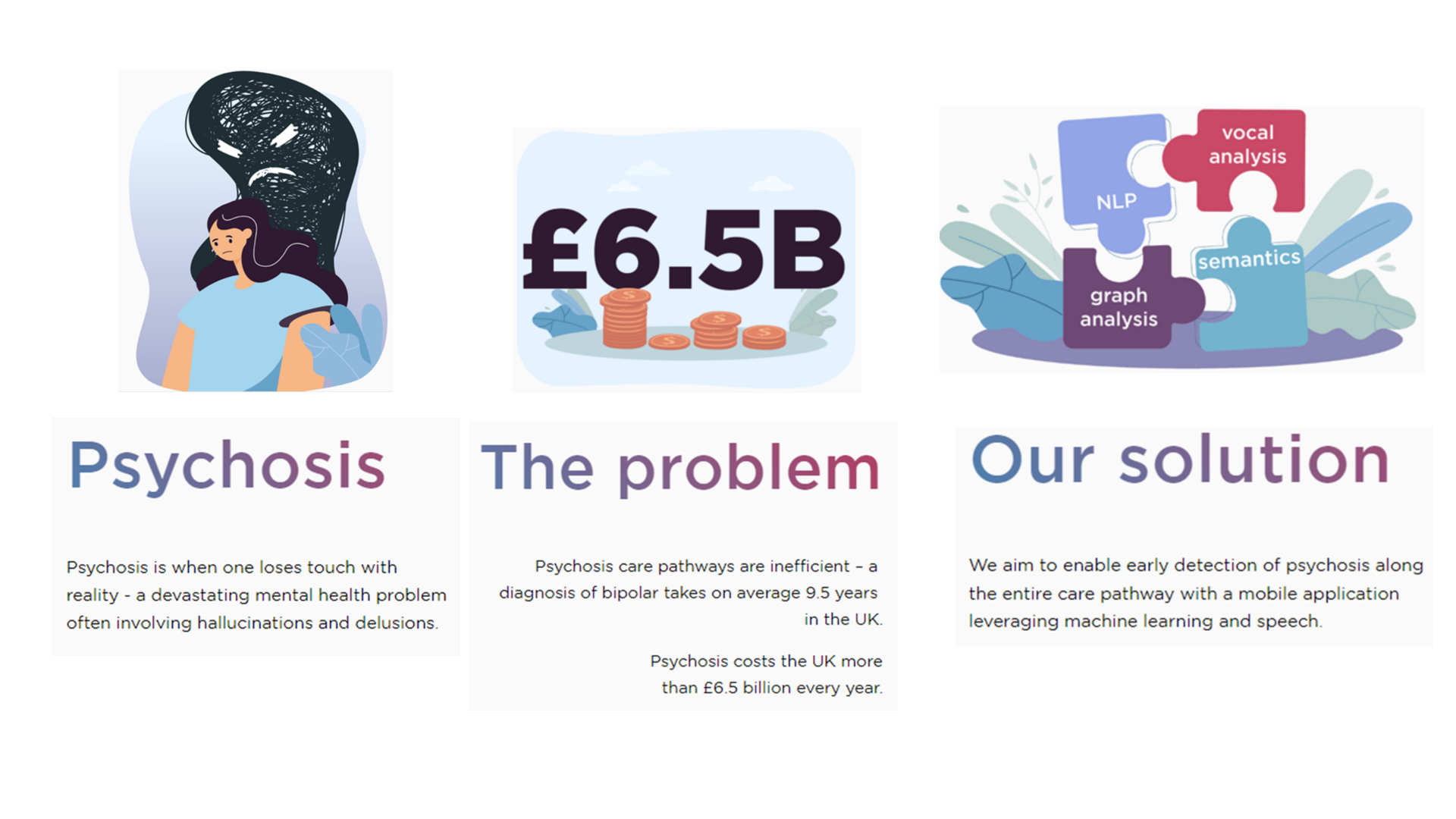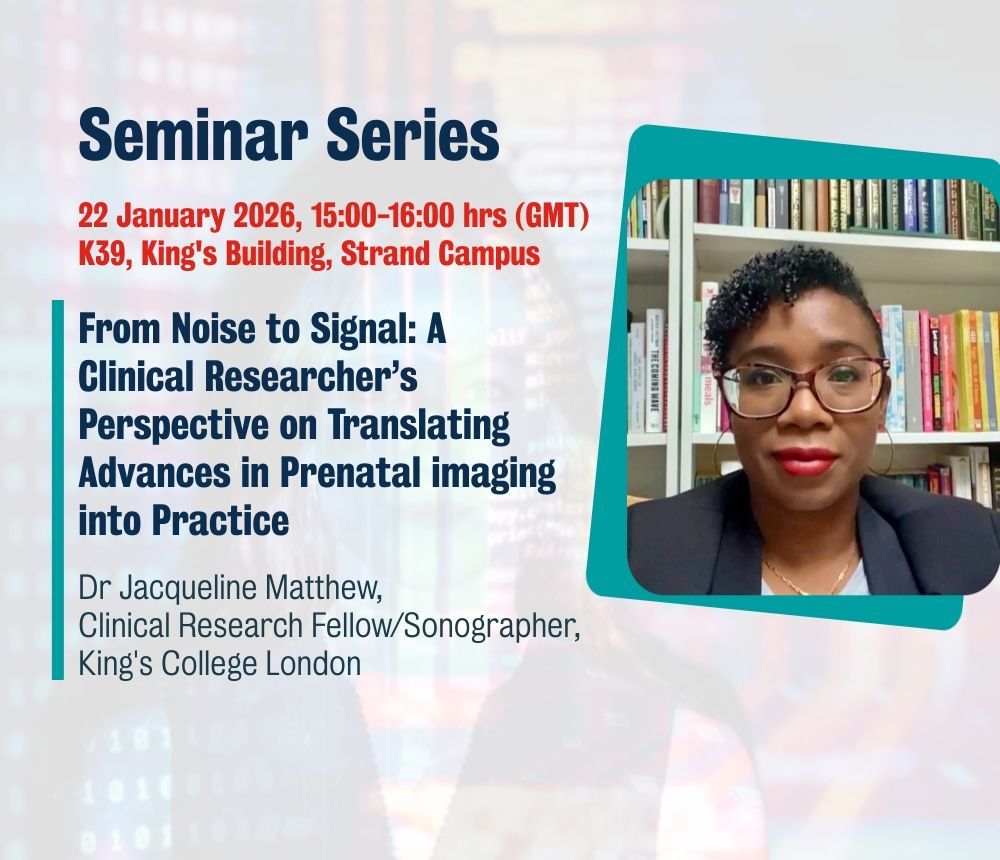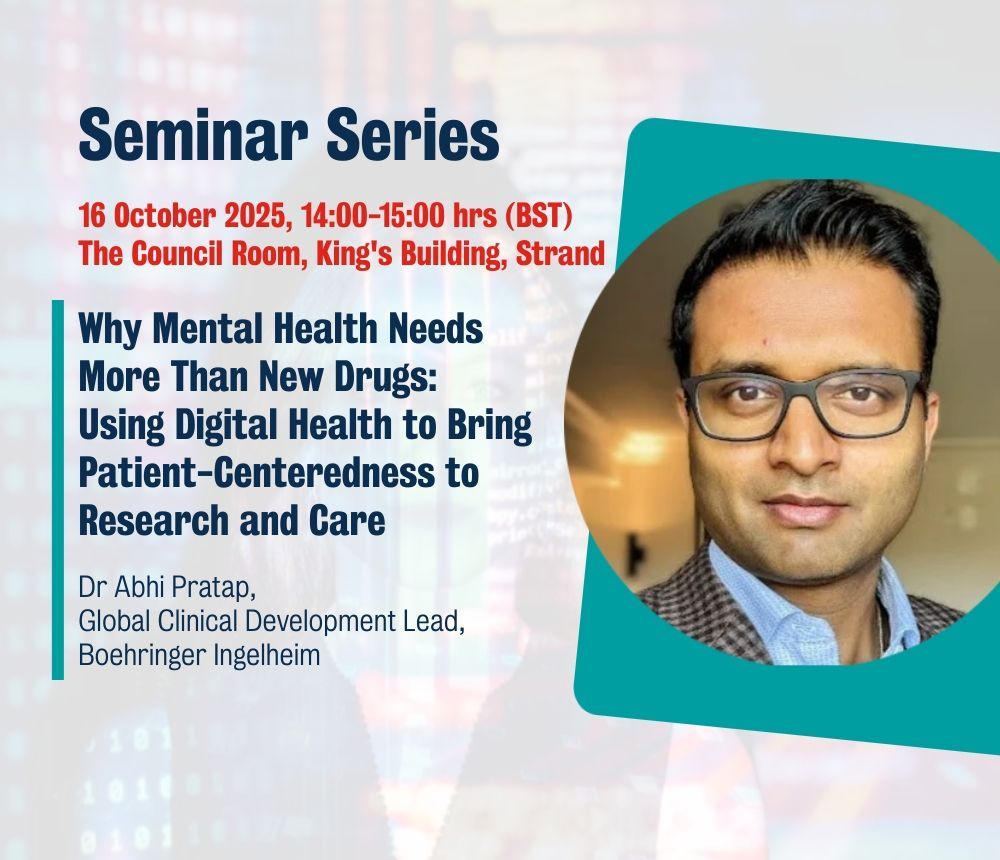Enabling early detection of psychosis with speech and AI
February 16, 2023
New start-up team at Psyrin are disrupting psychosis care with speech and AI

A London-based startup looking to transform psychosis care through the power of speech has been developing machine learning algorithms that will detect impending psychosis from speech samples collected using just a smartphone. With Psyrin, practitioners along the psychosis care pathway will save time, improve triage accuracy, and increase capacity.
Julianna, one of the co-founders of Psyrin has been inspired by the suffering of her loved ones to work on solving mental health problems. By studying psychology, she realized the importance of prevention in mental health care.
"In case of severe mental disorders, especially in psychosis, the effect of prevention and early intervention can be really difference-making in the patient's life. However, preventative treatments need tools and technology to upscale and be accessible for as many people as possible."
At Psyrin, they want to unlock the potential of objective, scalable, AI-powered analysis of speech to help clinicians screen, triage and monitor and understand patients better, in a more effective way and eventually, use their technology to transform psychosis care pathways from reactive to preventative.
Supported by the
King's Entrepreneurship Institute.
Share

We are pleased to welcome Dr Jacqueline Matthew - Clinical Research Fellow/Sonographer at King's College London - who will deliver her talk “From Noise to Signal: A Clinical Researcher's Perspective on Translating Advances in Prenatal imaging into Practice" as part of our Seminar Series. Abstract: Over the past decade, machine learning approaches in prenatal imaging has advanced from exploratory academic prototypes to clinically usable, real-time tools, but the path between those two endpoints is rarely straightforward. In this talk, Jacqueline offers a clinical researcher’s perspective on translating biomedical engineering innovations into real-world impact, tracing the journey from the iFIND project’s early breakthroughs in automated fetal imaging to the creation of Fraiya, an AI-driven ultrasound platform now entering clinical deployment. She will unpack the technical, clinical, and regulatory hurdles that shape this trajectory: data acquisition at scale, annotation complexity, model robustness, pipeline optimisation for real-time use, clinical safety engineering, regulatory strategy, and integration with NHS digital ecosystems. Beyond the technical achievements, the session reflects honestly on the innovation “gaps” that researchers and engineers encounter when stepping into entrepreneurship. From productising research outputs, building 'with' clinicians and service users not just 'for' them, securing buy-in, navigating procurement, and proving value in operationally stretched healthcare services. The aim is to provide a pragmatic and motivating roadmap for researchers and innovators seeking to turn biomedical AI research into deployable, sustainable solutions in healthcare. Seminar Series Event : “From Noise to Signal: A Clinical Researcher's Perspective on Translating Advances in Prenatal imaging into Practice. Date and Time: Thursday 22 January 2026, 15:00 – 16.00 hrs (GMT) Location: K39, King's Building, Strand Campus Attendance: Mandatory for all DRIVE-Health students, therefore please accept the calendar invitation. Registration: Alumni and wider King's College London research community all welcome - please email drive-health-cdt@kcl.ac.uk to let us know if you would like to attend. Biography Jacqueline is a clinical academic, sonographer, and MedTech entrepreneur with over 20 years of experience in advancing pregnancy care through compassionate, technology-driven solutions. Specialising in ultrasound and fetal MRI, Jacqueline’s work focuses on leveraging cutting-edge imaging technologies to improve screening, diagnosis, and care for pregnant women. With a PhD in advanced 3D ultrasound and fetal MRI, Jacqueline uses machine learning to refine diagnostic pathways, pushing the boundaries of what’s possible in prenatal care. As Clinical Lead and Chief Medical Officer at an early-stage health tech startup, she has been at the forefront of developing a real-time AI-powered pregnancy ultrasound platform, with ambitions to transform how scans are performed, enhancing diagnostic accuracy, and empowering healthcare professionals to deliver more informed and compassionate care. Jacqueline’s work has earned her widespread recognition, including being named one of the inaugural winners of the NHS England CAHPO Gold Award for Excellence, which celebrates health professionals who exemplify exceptional contributions to healthcare and the NHS values.

We were thrilled to welcome Dr Abhi Pratap - Global Clinical Development Lead at Boehringer Ingelheim who delivered our October Seminar Series. In his talk “Why Mental Health Needs More Than New Drugs: Using Digital Health to Bring Patient-Centredness to Research and Care" , Abhi shared case examples from emerging clinical studies to show how digital health can bridge the gap between clinical research and patient care in mental health. We will explore digital health solutions that help quantify the real-world experiences of health that matter to people - bringing us closer to understanding what treatments work for whom, why, when, and for how long. Abstract: Innovation in mental health treatment has been strikingly limited compared to other fields of medicine. In the last 15 years, fewer than five truly novel psychiatric drugs have received regulatory approval. This stagnation reflects multifaceted challenges linked to heterogeneity of psychiatric disorders often lacking biological markers grounded in disease biology. Additionally, there is significant reliance on subjective clinician-, rater-, or patient-reported outcomes, which increases variability in trial outcomes and poses challenges in patient selection and endpoint determination. Clinical studies also encounter persistent obstacles, such as high dropout rates, poor generalizability, and endpoints that frequently do not reflect what patients and their families value most. Consequently, there is a critical gap in new treatment development that are patient-centered, enhancing quality of life in real-world settings. Use-case-centered implementation of digital health technologies offers a realistic path to address many of these barriers. Real-world data collected from smart devices can enable the continuous and ecologically valid capture of mood, cognition, behavior, and functioning, augmenting traditional, episodic assessments. This richer measurement framework can enhance sensitivity to change, reduce trial inefficiencies, and ground outcomes more directly in patients lived experience. In addition, the same smart devices can be used to deliver digital adaptations of psychosocial interventions, expanding access to evidence-based care and offering personalized and scalable options for populations that have been historically underserved due to stigma, geography, or cost. Dr. Abhi Pratap is the Global Clinical Development Lead at Boehringer Ingelheim, where he oversees clinical development programs for digital therapeutics aimed at addressing unmet needs in serious mental illnesses. Before joining Boehringer, he worked at Biogen, managing one of the largest decentralised studies on cognitive trajectories in real-world settings in collaboration with Apple. With over 15 years of experience in translational biomedical research, Dr. Pratap has led numerous health research studies that promote partnerships between academia and industry. His primary focus is on using digital health technologies to gain a deeper understanding of the real-life experiences of individuals with neurological and psychiatric disorders. His cross-sector research aims to accelerate patient-centered clinical development in central nervous system (CNS) disorders. Most recently, he led a successful pivotal Phase III trial targeting experiential negative symptoms of schizophrenia (NCT05838625) using a digital therapeutic. This study is among the first confirmatory trials to show improvement in negative symptoms to date. Additionally, Dr. Pratap serves as an adjunct faculty member at the University of Washington in Seattle and Boston University, and he is a visiting research fellow at King’s College London.





